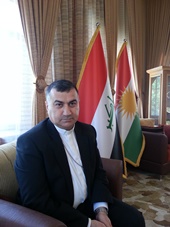|
Helping refugees in Iraqi Kurdistan An interview with Bashar Matti Warda, the Chaldean Bishop of Ankawa in Iraqi Kurdistan, who is preparing for a fresh influx of refugees. by Oliver Maksan Your Excellency, how many refugees have sought refuge in your diocese? We are at present looking after about 400 Christian families who have come to us since the beginning of June from the Mosul region. These include Chaldeans, Syriac Orthodox and Syriac Catholic Christians. The Kurdish government has opened the borders to Christians, while Muslims from the areas affected by ISIS are only granted something like a temporary residence permit.
When we approached the government here we made clear that the Christian families had no intention of returning. On the other hand, the Muslims do. The Kurds said that they would, of course, prefer it if the Christians were able to remain in their homeland where their possessions are. But in this situation they made immigration easier. Are the refugees being supported by the Kurdish government? In the most recent crisis at the end of June, when twenty thousand Christians fled from Karakosh because hostilities had flared up between ISIS and the Kurds in their area, the provincial governor of Erbil came to receive the refugees. Furthermore, representatives of various governmental authoritieswere there. They gave us advice. But we did not receive any material support. Are you as Bishop not overburdened with regard to the aid for the refugees? Yes. We can't cope with it by ourselves. We don't even have the team to cope with such an influx in a qualified way. Fortunately the people from Karakosh were able to return to their town after a few days, once the situation had calmed down. The refugees from Mosul are still here, however. What will happen with them in the long term? Well, they won't be returning. Either they will stay here in Kurdistan or they'll go to another country, to Turkey or Lebanon. Many have already begun to do this, unfortunately. What possibilities do you have for keeping the Christians in Kurdistan? We would have to be able to provide homes and jobs. But that's difficult. We as a diocese cannot offer that. We would have to work together with the government and foreign aid organizations here. Do you think that Christianity has a future in what is at present still Iraqi Kurdistan? Going by what we have experienced for years, I would say yes. Not only is there security here, but the government is prepared to listen to our concerns. This became evident in the present refugee crisis. But there are also critical elements. For example, there are disputes over land between Christians and Kurdish villages. The government promised to provide a remedy. We're still waiting for it, however. But things are proceeding more quickly in other areas. The parties ruling Kurdistan tend to operate within a secular tradition. Does that make for more pluralist conditions? Yes. Whenever we have dealings with the government we can sense this. Of course, there are also people here with narrow views. But that is not the government's attitude. Many Christians complain that there are also Islamic parties here. Not too long ago, in a number of Kurdish towns in the north, Christian liquor stores were attacked by fanatics. Does that make you worry about the future? Yes, such things happen. You have to be realistic. Such movements are rising in the whole region. They will also reach Kurdistan. Quite definitely. But at least the government's keeping an eye on the problem. But it unsettles many Christians. They say: Everything's OK today. But how will things be here tomorrow? I understand that. But I think that the government would intervene beforehand. What can Aid to the Church in Need do for the Christians in Iraq in this difficult situation? We have always asked for your prayers. And please continue to help us to make known our situation to politicians and the general public. We also thank you for supporting our emergency aid programs. We are anticipating difficult times for towns like Karakosh and others. So are you afraid that new hostilities may reach these Christian towns and trigger off new waves of refugees? Who can tell? We must in any case be prepared.
|
|
|

 Why do the Kurds distinguish between Muslims and Christians?
Why do the Kurds distinguish between Muslims and Christians?